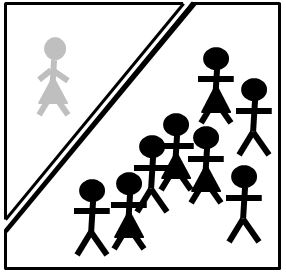Abusive people often isolate the people they want to control. This happened to me and is chronicled in my book Husband, Liar, Sociopath: How He Lied, Why I Fell For It & The Painful Lessons Learned (available via Amazon.com).
Isolation is a Huge Red Flag
Isolation is a red flag that should never be ignored. Due to Paul (not his real name) “working” such long hours and on weekends, we had virtually no social life as a couple. Yet, if I went out with friends alone, Paul was often home early that night waiting for me.
Here’s a Typical Exchange
“Hi, Paul, it’s great you’re home. I thought you wouldn’t be home ”˜til after midnight.”
“We got done early,” Paul said, his face devoid of any “nice to see you” smile. “I was really hoping you’d be here ”¦ the one night I’m back before midnight ”¦”
Of course, I’d made perfectly reasonable decisions and had nothing for which I needed to apologize, yet Paul encouraged me to feel that I’d been insensitive because he had been home alone for a short period of time.
“I’m really sorry,” I said, regretting losing a rare chance to spend time with my husband. I joined him on the couch and gave him a kiss. He returned it halfheartedly. The fun of my rare evening out evaporated.
“You abandoned me, again,” Paul said, then shut off the TV and walked out, leaving me alone in the dark.
Not Knowing His Behavior was Deliberate, I Searched for Answers
That deflated “What just happened?” feeling enveloped me. I started making excuses for him. Maybe he was just exhausted and disappointed because he’d hoped to see me when he walked through the door. Maybe he’d had a bad day at work. Maybe. Maybe. Maybe. It didn’t occur to me that this was a deliberate setup to isolate me by making me feel guilty about having a life of my own.
When I talked to Paul the next day, he said, with an appropriately caring but incredulous tone, that of course he’d just been kidding about feeling abandoned and that he couldn’t believe I took his comment seriously. “I don’t know what you’re talking about. Of course it’s great you went out with friends.”
“How Dare You Have a Life of Your Own”
As most communication is nonverbal, what had Paul actually expressed? Something like, “Don’t you dare have your own life, or I’ll withhold love from you.” Would he ever admit to that? Of course not!
Paul’s nonverbal message in this case, and in countless others, influenced me below my conscious awareness. I started feeling tense when friends suggested I do something with them or when I considered calling them to make plans. As a result, I started isolating myself by going out less, especially when it might interfere with time with Paul. If I did go out, I’d leave early, just in case Paul beat me home. Before long, invitations from colleagues waned. Too often my answer was “No,” or a guarded, “I have to leave early.” Anything that weakened and isolated me made me more malleable, more dependent on Paul.
Subtle Criticism Shapes Choices
Looking back, another ploy Paul used to isolate me and to keep the world from responding to me positively was to imply that my friendships with male colleagues were inappropriate. I worked in financial investments, so many of my colleagues were male. Paul encouraged me to dress conservatively in dark, drab colors and in professional but not flattering clothes. He implied that, by wearing makeup, I was trying to attract other men. I started to feel bad when I even considered putting on mascara, and at some point, without making a deliberate decision, I stopped.
Intermittent Reinforcement
While helping me craft my own love-starved, negative environment, Paul did not completely withdraw his love. Were it clear that Paul did not love me anymore, never would, and perhaps never had, I am sure I would have sought a divorce. Instead, he expressed his love sparingly, and, as a result, inconsistently—a small act of kindness here when least expected, a nice dinner together there. Psychologists call this type of reward system “intermittent reinforcement.” It’s inconsistent and unpredictable, and it has a dark side. It is strongly linked to highly addictive behavior. It is our response to intermittent reinforcement that keeps us playing a game that is stacked against us, because the occasional win keeps hope alive.
Intermittent Reinforcement and Addiction
Decades ago, the famous psychologist B.F. Skinner observed that intermittent reinforcement of something of value (e.g., food for animals) creates highly addictive behavior. I knew about this from college psychology classes. What I didn’t know, however, was that it was being used on me and is a cornerstone of emotional abuse.
A slot machine is one of the most intuitive examples of how intermittent reinforcement works. These machines have varying financial payouts at unpredictable times. When a player wins at a slot machine, he or she feels good and gets money—two things the player values. The only way to achieve this success is to play the game again and again and again, enduring failure after failure along the way.
It’s hard for the player to stop, because a big, exciting reward might be just one lever pull away. Because there is no exact correlation between the gambler’s actions and the payout of the next pull of the handle, the slot machine could even be broken and unable to issue any positive payout, but the player would have no way of knowing this. Once the addictive behavior has been established, the player will likely persist at the game for a long time.
Early “Love Bombing” Sets the Stage for Later Addiction
Now, think of Paul as the slot machine and think of the payout not as money but as love—something fundamental to human existence and happiness, and something I value as a normal, healthy human being. I particularly valued Paul’s loving attention, because his maneuverings and my decisions had put me in a love-starved environment, isolated from family and friends. Just like the person pulling the slot machine lever and hoping for the next big payout, without even deciding consciously to do this, I continually tried to please Paul and connect personally with him, hoping to stumble onto something that would trigger him to act in a loving way toward me again.
I knew he was capable of showing me love and affection, because he’d directed those feelings toward me in the past (especially the initial love-bombing stage), and I saw him acting in a caring way toward other people (Dr. Jekyll/Mr. Hyde behavior is typical of sociopaths after the love-bombing stage). Believing I would receive a positive response eventually, I persisted. The payoff I got, albeit infrequently and unpredictably, only served to keep me in the game, hoping for the next payoff—maybe it would be the next time, or the next, or the next ”¦
No Contact!
Once neural addictive pathways have been paved, we don’t get to just erase them once we understand they exist. Even in the absence of the sociopath trying to pull us back in (which would be a blessing if that were to occur), these addictive pathways are among the reasons leaving a sociopath can be so difficult, why it can be so challenging to put the relationship behind us once we leave, and why “no contact” is critical, once we do leave. It’s hard to pull away from a sociopath. It’s really hard. And the fact that we are able to do so, even amidst pain and chaos is testament to our strength–strength we may not even know existed until we must tap it in order to survive.
Identifying names, places, events, characteristics, etc. that I discuss here and in my book have been altered to protect the identity of everyone involved.





































 So when is a spiritual leader actually a sexual predator?
So when is a spiritual leader actually a sexual predator?
stunnedmullet
oh crickey storm- you are amazing, a great mum, a great daughter and no doubt a great and true friend. You have come through hell and remained focus on what matters-the above, your ability to mother and hold onto those values so close to your heart Bravo brave lady, bravo.
ignore the bullshit and focus on what you know as clearly you have a higher understanding of how to behave and what matters.
Thanks everyone for the support, every time I come on here and read every ones experiences I am constantly surprised that we are not or have not being seeing the same person in the flesh so to speak. when I think of the destruction of lives and trauma caused its awful and reassuring at the same time.
I know that sounds odd because clearly with all my heart I wish NONE of this happened to any one of us.
but while at work or on train and I am thinking- thinking about my situation, I also think of everyone here and know we will be okay.
Different from how we were, smarter, wiser, somewhat battered and bruised on several levels, but okay.
better than with them.
I went to the Doctor today and had a full STD check up with a brief explanation of why -I have no proof of any cheating but since he was so constantly saying I was cheating-logic told me to get a check up.
The doctor asked if I was going to confront my ex, I said nope, no contact.
she didn’t speak for a little while and said, Christ, that’s the only way with some people isn’t it??. I have so many women come in here with horrible stories and have to do these test, and then next thing they are back with the guys.
I told her about this site and said, it seems no contact is the only way, otherwise our better natures combined with that awful tiredness and constant pressure they can apply-we could end up back with them, so no contact seems the only way to me.
so instead of feeling like, welllll scum, like I did when I first walked in, I walked out feeling that I did a very mature and smart thing.
I think he cheated as no way could he of survived without that kind of drama and attention- as my mind tells my heart and soul-“Facts people, we must face facts and deal with them, wide eyed and straight forward”.
then kinda fall over crying in a small heap or kick the rubbish bin.
all my best thoughts hopes and wishes to you all..
Stunnedmullet
Sunnygal
Intermitent reinforcement is very subtle.
Sunnygal
Wonderful article.
shamrock007
Wow…….. Is all I can say!
If I didn’t know any better I would wonder if you had camera’s in my home. You have just described my relationship to a tee. And that has really opened my eyes to what I am going through…… Thank you for your story. You are a very brave & courageous person and I am grateful for the knowledge that you have given me and that IF I dont leave this toxic relationship it will only get worse, never any better. Thank you again, and God Bless you and your loved ones.
Sunnygal
Wonderful article. I got alot from it.